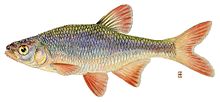Common shiner
| Common shiner | |
|---|---|

| |
| Scientific classification | |
| Kingdom: | |
| Phylum: | |
| Class: | |
| Order: | |
| Family: | |
| Genus: | |
| Species: | L. cornutus
|
| Binomial name | |
| Luxilus cornutus (Mitchill, 1817)
| |
| Synonyms | |
|
Notropis cornutus | |
The common shiner (Luxilus cornutus) is a freshwater fish of the Cyprinidae family, found in North America. It ranges in length between 4 and 6 inches, although they can reach lengths of up to 8 inches.[1]
Description
The common shiner is silvery colored (sometimes bronze) and has an "olive back with a dark dorsal stripe." [2]
The common shiner is a freshwater fish that can be found in North America. Adults inhabit rocky pools in small to medium rivers. They can live to be approximately 6 years old.[3]
They are considered sexually mature by 7.4 cm. Breeding males have a pinkish tint over most of their body and small bumps or tubercles on their head.[4]
In comparison with other Notropis, the common shiner's head, eyes, and mouth are large.[1]
Life History
The common shiner can be found in cool clear creeks and small to medium rivers, usually in the faster pools near riffles [clarification needed] and in the shallow littoral of ponds and lakes. [2] Its preferred water temperature is 21.9°C.
The common shiner reaches sexual maturity by 1-2 years of age, and produces between 400 and 4000 eggs per year. Common shiners spawn in spring between May and June, at temperatures of 16-26°C. Common shiners often spawn over the nest of a creek chub, river chub, or fallfish, although some males will make their own small nests. Gravel in riffles is also possible.[1] Once the eggs are ready the male guards the nesting site. [2]
Common shiners are known to hybridize with other shiner species.[1]
Common shiners live for about 5-7 years.
Diet
The common shiner eats "terrestrial and aquatic insects, vegetation, and other fishes." [2]
Predators
Predators of the common shiner include fish (such as the smallmouth bass and chain pickerel) and birds (i.e. mergansers and kingfishers). [2]
References
- ^ a b c d "Common Shiner (Notropis cornutus)". Archived from the original on 2008-05-04. Retrieved 2008-06-06.
- ^ a b c d e "Common Shiner". Retrieved 2008-06-06.
- ^ "Common Shiner". Retrieved 2014-02-27.
- ^ "Common Shiner". Retrieved 2014-02-27.
